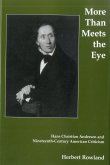In this remarkably stimulating and erudite series of essays, Eugene Chen Eoyang explores many of the underlying paradigms and presumptions in world literature, highlighting issues of cultural interchange and cultural hegemony. Translation is seen in this perspective as a central rather than a peripheral factor in understanding the meanings of literary works. Taking concrete examples from Chinese literature, Eoyang illuminates not only the semantic collisions that underlie the complexities of translation, but also the cultural identities reflected in language and values. The title alludes to a passage from Emerson, reminding us that the object on view is not only the vision we see but is also the organ through which that vision is apprehended. The confrontation with a radical "other" - which is, for many Westerners, what Chinese literature represents - is thus both a discovery and a self-discovery. Part of the book's originality is that it identifies a new audience - one that is incipiently bicultural, or knowledgeable about what has been called "East" as well as what has been called "West". Readers with an interest in the theory and practice of translation will find this an inspiring and indispensable work, one that prepares the way for a comparative poetics that recognizes the intense subjectivities in every culture and at the same time establishes a basis for a comparison that tries to transcend, even as it acknowledges, provincialities.
Hinweis: Dieser Artikel kann nur an eine deutsche Lieferadresse ausgeliefert werden.
Hinweis: Dieser Artikel kann nur an eine deutsche Lieferadresse ausgeliefert werden.








